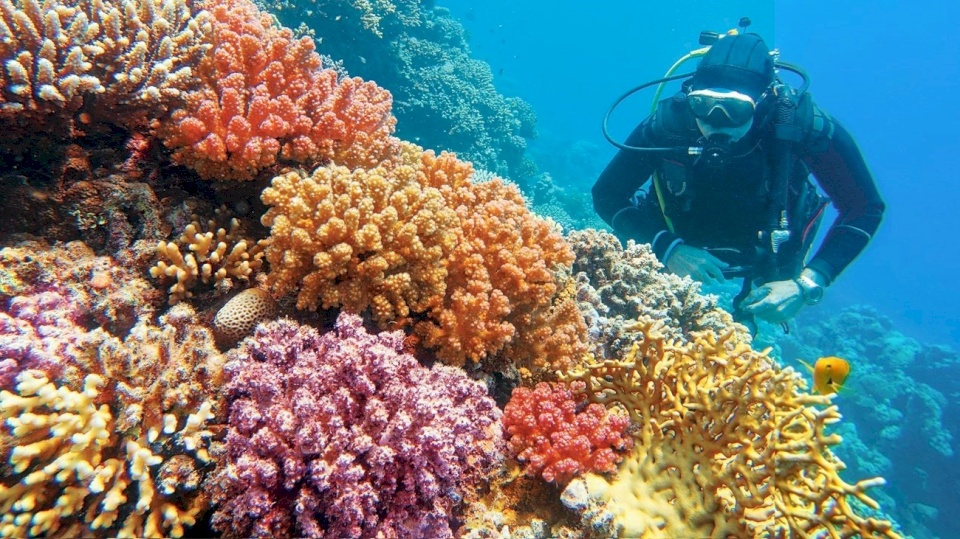
Warnings About Coral Reefs Reaching a Critical Tipping Point
SadaNews - A new report indicates that the Earth has reached its first catastrophic tipping point related to greenhouse gas emissions, as coral reefs in warm waters now face a critical turning point, threatening the livelihoods of hundreds of millions of people.
The "Global Tipping Points" report, contributed to by 160 scientists from 87 institutions in 23 countries, warns that coral reefs around the world are now in a state of almost irreversible death, described by scientists as the first "tipping point" in the collapse of the ecosystem due to climate change.
The report also confirms that the world is "on the brink" of reaching other critical tipping points, including the death of the Amazon rainforest, the collapse of major ocean currents, and the loss of ice sheets.
The report states: "If we do not return to a global average surface temperature of 1.2 degrees Celsius, and eventually to at least one degree Celsius as soon as possible, we will not be able to maintain warm coral reefs on our planet on any reasonable scale."
Scientists define tipping points as moments when the major ecosystem of the planet reaches a point where severe degradation is unavoidable.
Coral reefs worldwide are home to about a quarter of all marine species, providing natural protection for coastlines by acting as wave barriers, but they are considered one of the most vulnerable systems to global warming.
They have been experiencing global bleaching since January 2023, the fourth and worst ever, with approximately 84% of the reefs in over 80 countries affected by extreme ocean temperatures and water acidification. Scientists say this phenomenon has practically driven coral reefs into an "unknown phase."
Coral death, manifested by color change towards white, is a result of rising water temperature and acidification, leading to the expulsion of "zooxanthellae" algae that provide corals with nutrients and their vibrant color. If high temperatures persist, corals shrink and die.
Scientists confirm that if rapid and unforeseen reductions in greenhouse gas emissions are not made, temperatures could reach the 1.5-degree Celsius maximum within the next ten years.
Professor Tim Lenton from the Global System Institute at the University of Exeter stated: "We can no longer talk about tipping points as a future risk. The first shift in the path of widespread coral death in warm waters has already begun." He added that this is already affecting hundreds of millions of people who rely on coral reefs.
The report points to the "collapse" of coral reefs in the Caribbean due to marine heatwaves, declining biodiversity, and disease outbreaks.
Professor Peter Mumby, a prominent coral scientist at the University of Queensland, Australia, acknowledges that coral reefs are in a state of "decline", but affirms emerging evidence that some can adapt and remain viable even with a two-degree Celsius rise in global temperatures.
He expressed concern that society might "give up on corals" if people believe they can no longer be saved.
Dr. Mike Barrett, Chief Scientific Advisor at the World Wildlife Fund in the UK and co-author of the report, states that this "demonstrates that preserving coral reefs has become more important than ever. The rules of the game have changed, and the response must be extremely urgent."
Scientists have suggested that in order to recover coral reefs, climate action should be radically intensified to revert temperatures to just one degree Celsius above pre-industrial levels.
In the context of climate tipping points, the report confirms that the rainforest system itself is now at risk of collapse once the average global temperature rises above 1.5 degrees Celsius, based on current deforestation rates.
What is concerning, according to the report, is the threat of disrupting the main ocean current known as the Atlantic Meridional Overturning Circulation (AMOC). Tim Lenton, an ecologist at the University of Exeter and the lead author of the report, stated: "Change is happening rapidly now, tragically, in parts of the climate and biosphere."
Source: The Guardian

Price Comparison of the Most Preferred Phones for Egyptians Abroad

Why Have Shark Attacks Reoccurred on Australia's Beaches?

How to Consume Lamb Meat in a Healthy and Safe Way?

Engineer Detained for Impersonating a Dermatologist in Egypt

Stroke Patients Regain Their Ability to Speak Thanks to This Innovation

Berlin Festival 2026: Films Reflecting Family Concerns and the World’s Anxieties

8 Tricks for Back Comfort on Long Flights

